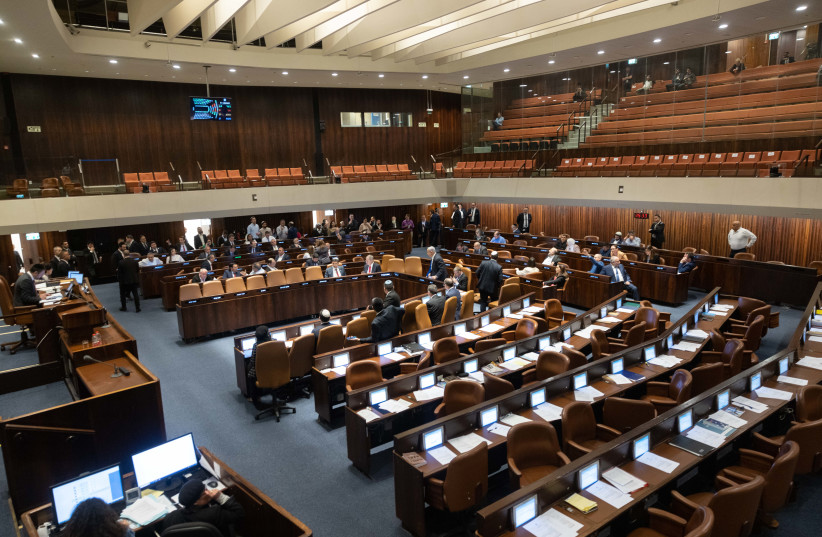A trend in calls to renew the constitutional process evolved last week into concrete mainstream proposals for the establishment of a formal written constitution.
The calls for a constitution developed out of a need to address the problems in the legal system as well as provide a positive opposition negotiation platform.
Not long after the judicial reform was proposed in the first week of January, in explaining the arguments over the problems in the legal system, legal experts in passing would often touch upon the legal gaps created by Israel’s lack of constitution and stalled constitutional process.
For example, many reformist complaints about judicial review arise from how the power is not written and properly defined in law and instead inferred by the High Court of Justice. Other issues regularly touched upon include that the limits and relationship between the legislature and judiciary are not properly codified in Basic Laws, and there is no special method and legal value for these Basic Laws. For the opposition, there was concern about the vulnerability of human rights not explicitly written into law to the reform plan.
The arguments surrounding these issues and more were seeded as mistakes at the dawn of the state. Instead of writing a constitution, the country’s founders sought to avoid political strife by creating a compromise in which Basic Laws would be introduced and then compiled into a constitution at an undetermined time.

Plans for the reform
Constitution, Law and Justice Committee Chairman Simcha Rothman has argued that everyone has accepted the need for reform, but they debate on how this should be achieved. Indeed, as arguments around these issues progressed, alternatives for reform were proposed instead of just outright cancellation.
On February 12, President Isaac Herzog proposed a five-point plan for reform negotiation that included Basic Law: Legislation. This article has long been considered a missing essential part of the constitutional process, as it would enshrine the nature of Basic Laws and establish the relationship and boundaries between the Knesset and High Court.
While this wasn’t a direct call for a renewal for the constitutional process, a major NGO, the Israel Democracy Institute, a day later issued a proposal to do just that.
A week later, the opposition leader, Yesh Atid MK Yair Lapid, submitted Basic Law: Declaration of Independence, to enshrine the values and rights detailed in the document.
The Declaration of Independence has become a symbol of the opposition movement, not just because it is a solution to the problem of a missing human rights legal regime, but because the protests began to push for their own positive objectives rather than just the nullification of their political opponent’s goals. The declaration has increasingly appeared in banners and signs and cited in speeches. On Thursday, National Unity leader Benny Gantz symbolically re-signed the founding document.
Last Monday, Herzog renewed his push for negotiations on the reforms for judicial reforms. He said he would present a new outline, which was followed by several new outlines for negotiations such as the Friedmann outline.
For the opposition to negotiate, it must have clearly defined positive demands, which are, again, more than just about negation of policy. This was clearly expressed by legal experts including Prof. Barak Medina, who called to set the agenda and offer guidelines for negotiation with a constitution proposal based on the Declaration of Independence on February 26.
This need to set negotiation boundaries was reiterated by Movement for Quality Government in Israel’s Eliad Shraga when they proposed their own constitution on Thursday.
The two streams of thought, solving the problems of the system and offering one’s own value platform for negotiation with a constitution, reached a crest when Lapid issued his own proposal for a constitution based on the Declaration of Independence. He argued that a constitution would solve the problems of the system. While he didn’t explicitly address using it for negotiation, the announcement came the morning after Herzog’s harsh speech demanding negotiations before the country was ripped apart. Lapid’s constitution proposal explained that such a document would unify the nation.
It remains to be seen if these calls for a constitution will be more widely adopted by parties and will more consistently enter the discourse. It is equally unclear if the intent to offer alternative values and address the problems with a constitution is genuine or a momentary stimulus response to political action.
One indication that the proposals are genuine is that Lapid, Shraga and Medina all stated that Israel should seize the “crisis” as an “opportunity.” Perhaps this trend will continue to develop – or maybe the state will sow more mistakes for future generations to reap.
